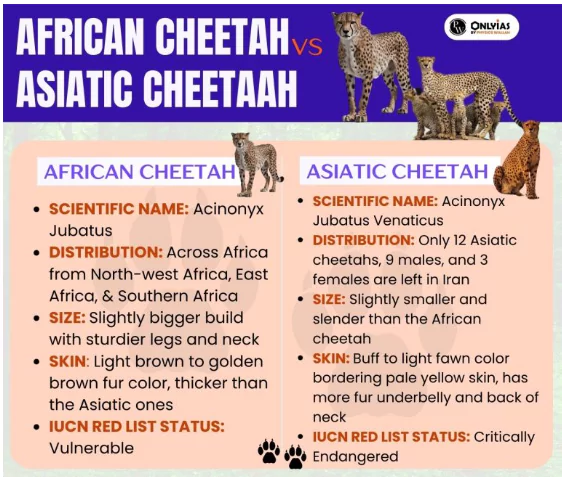A new study examining the ethical, ecological and welfare concerns associated with the translocation of African cheetahs to India has raised questions about the project’s scientific merit and long-term viability.
About the Study
- Titled: The study is titled, “Delineating the environmental justice implications of an experimental cheetah introduction project in India”
- Published In: It was published in Frontiers in Conservation Science.
- Conducted By: The study was conducted by the researchers of the Centre for Wildlife Studies (CWS), Blood Lions Non Profit Company (NPC) and University of Johannesburg, South Africa.
- Approach: The researchers applied a distributive, procedural, and recognition justice approach for both the marginalised people and non-human species affected by the project.
- Literature Review: The researchers reviewed the reports prepared for the translocation of Asiatic lions and African cheetahs to the Kuno National Park (KNP) in Madhya Pradesh.
- Findings:
- The Mortality Rate: The Mortality Rate of African Cheetahs was 40%-50% in the first phase of the project, far below the expected survival rate of 85%.
- Deteriorating Physical and Mental Health: The translocated cheetahs have experienced high levels of stress, with over 90 chemical immobilisations and regular veterinary interventions
 Ecological and Species Injustices: Translocated African Cheetahs have undergone significant stresses like adapting to a different climate, prey species, and habitat
Ecological and Species Injustices: Translocated African Cheetahs have undergone significant stresses like adapting to a different climate, prey species, and habitat - Undermining the Potential of human–Wildlife Conflict: The local communities were assumed to be tolerant to the presence of cheetahs on a simplistic and generalised basis of following Hindu religion and ignoring the complex webs of socio-ecological systems which forms human–animal relationships.
- Flawed Methodology: The focus was on identifying economically and socially disadvantaged targets for monetary incentives and Social issues like attitudes toward relocation, exotic species introduction, project acceptance, and perceived risks and benefits were neglected.
- Methodology For Assessing “Anthropogenic Activities”: It was unclear with some sites discussing only linear infrastructures and industrial pressures without mentioning local communities, while others ignored industrial impacts.
- Not Ecologically Sustainable or Ethical: A continuous supply of cheetahs from southern Africa (12 cheetahs/year) is agreed to maintain a thriving population in India is neither ecologically sustainable or ethical with high mortality rates observed.
- The cheetahs as of now are kept in confinement which is opposed to their free ranging nature.
- Suggestions:
- Animal Welfare: To address the lack of research on social and animal welfare in the legal trade of wild animals
- Assessment Criteria: To recognise diverse values, understanding potential inequitable impacts, focusing on historically burdened groups and identifying social issues like attitudes toward relocation, exotic species introduction, project acceptance, and perceived risks and benefits should be the assessment criterion.
- Conduct Social Audits as mandated by the Supreme Court and a “rapid assessment” of potential sites surveyed in 2010.
- Change in Methodology: Conservation successes need to be measured by going beyond ecological processes of birth and death but gauging impacts on an animal’s physical, physiological, and mental health.
About Project Cheetah
- Project Cheetah is an ambitious wildlife conservation initiative aimed at reintroducing cheetahs to India which went extinct in 1952.
- The Project involves relocating African cheetahs (Vulnerable) to Indian soil, particularly to Kuno National Park in Madhya Pradesh.
- Kuno was chosen for its extensive grasslands and adequate prey population, providing an ideal habitat for cheetahs
- Aim: The Indian government hopes to bring 50 cheetahs from African countries to various national parks over the next five years.
- First Transcontinental Wild to Wild Translocation: Currently, a total of 20 radio collared Cheetahs were brought from Namibia and South Africa to Kuno National Park, Madhya Pradesh
- Objective:
- Restore Ecological Balance: Reintroducing cheetahs can help restore the grassland ecosystem, as they act as top predators in their habitat.
- Enhance Biodiversity: Cheetahs contribute to biodiversity by controlling prey populations, benefiting the entire ecosystem.
- Cultural Significance: Cheetahs were once part of India’s natural heritage, and their reintroduction symbolizes a restoration of India’s lost wildlife.
- Implementing Body: National Tiger Conservation Authority (NTCA), a statutory body under the Ministry of Environment.
|
![]() 20 Feb 2025
20 Feb 2025

 Ecological and Species Injustices: Translocated African Cheetahs have undergone significant stresses like adapting to a different climate, prey species, and habitat
Ecological and Species Injustices: Translocated African Cheetahs have undergone significant stresses like adapting to a different climate, prey species, and habitat